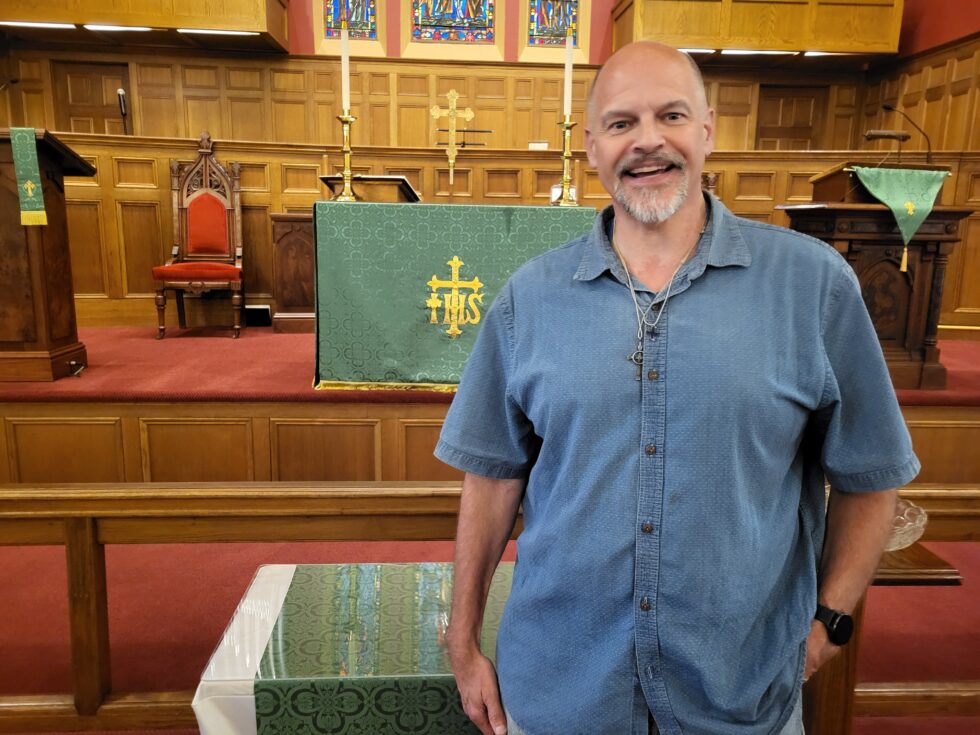
The split in the United Methodist Church over sexuality has created challenges for congregations. At Fredericksburg UMC, it may be charting a path into a new, promising future.
Twenty-three years ago last month the pre-eminent historian of American religion Martin E. Marty wrote in Sightings:
A nineteenth-century sermon illustration told of the time a town’s church was burning. At the head of the bucket brigade was the village atheist. Why show up now? “Because when the church is on fire is the only time anything exciting is going on.”
Denominations go pretty much neglected most of the time. But we now enter the season when the press discovers them, “on fire.” Not on fire with “the Spirit” but with self-set arson, as denominations engage in conflict over the one issue that inflames factions in all of them: homosexuality.
The controversy over sexuality has been smoldering in the United Methodist Church since at least 1972. It burst into open flames in 2023 as at least 227 Virgina UMC churches — about 20% of the UMC communities in the Commonwealth, and about 10% of the Virginia UMC population — “disaffiliated” from the conference over the issue of sexuality.
Fredericksburg United Methodist Church is among the churches staying in the UMC, but it has nonetheless felt the fallout of the debate over sexuality that has roiled the church worldwide.
“It’s hard to tell how many people we have lost,” says senior pastor Tim Tate. “Some longtime, prominent members have left.”
However, as the debate has settled down, the church is experiencing something of a renaissance in membership.
“When I came, we were running 270. Now we’re running about 300-320” on Sunday mornings, though he acknowledges the church has lost more in the traditional service than in its “contemporary” service.
“Once the decision was made” to stay in the UMC, Tate said, we became “a different church. And as a church and individual members of the church, we have to figure out how we fit into this new normal.”
Numbers Up, Dollars Down
While the number of attendees has been climbing, the FUMC has taken a revenue hit.
Among those who have left the church are a number of families who were significant financial contributors.
In January this year, it became clear that the church had to cut some $250,000 out of its budget.
“The only places to cut are staffing or programming,” Tate said. Consequently, “we went down five staff positions.” Those who are no longer on staff were all well-loved and connected, while one of the positions cut was particularly difficult because the individual was deeply loved by the congregation and handled much of the “congregational care.”
The Debate
In the General Conference of the UMC, the sexuality debate concerned both the ordination of gay pastors and conducting same-sex marriages.
When the General Conference created an off-ramp for churches to leave the UMC in 2019 through paragraph 2553 in the Book of Discipline (a section that sunset as of December 31, 2023), it was crafted with progressive-leaning churches in mind, according to Tate.
The UMC made disaffiliation relatively easy in that those who departed could take their buildings with them, so long as “they paid two-years’ worth of the apportionment owed church and a certain pension number for every pastor that church had,” Tate said.
Instead, the opposite happened with the more-conservative leaning congregations departing. Some became independent churches with no denominational affiliation, while others joined the Global Methodist Church, whose headquarters is here in Fredericksburg. [Editor’s Note: The Advance will follow up with a story about the GMC.]
“The prominent discomfort for more-traditional members of FUMC seems to be more over marriage,” says Tate.
The newly rewritten Social Principles adopted at this year’s General Convention “didn’t condone or condemn homosexuality,” says Tate. Instead, it “removed restrictions for homosexual clergy to serve and be ordained, and it removed restrictions on same-sex unions.”
However, churches have the power to decide if they wish to allow same-sex weddings on church property. “For churches,” Tate said, “the trustees decide if you can do that.”
A Hopeful Future
The United Methodist Church is far from the only Protestant faith community engaged in this debate. The Episcopal Church has been through its own split over this issue, as have the Presbyterians. The Southern Baptists continue to debate this issue, as well as the role of the women in the church.
All of this is happening against a national backdrop where interest in religion is in freefall.
Beginning around the year 2000, participation in American religious life took a sharp downward turn. And recent research suggests this decline is only going to accelerate.
The reasons for this vary. The clergy sex-abuse scandal in the Catholic Church, the perceived hypocrisy by young people in particular of churches that preach tolerance but continue to limit the roles of women and condemn LGBTQ+ individuals, and changing perceptions about churches’ overall value in both society as well as in the lives of individuals are just some of the commonly given reasons in one of the better treatments of this subject, The Great DeChurching by Jim Davis and Michael Graham.
But where the overall trends skew downward, Tate is seeing opportunity. In addition to rising numbers at FUMC, Tate believes that the debate the UMC has and continues to go through “opens us up to much more opportunity for people like the Nones, because we are creating a safe space for them to be.” (“Nones” is the term used by sociologists to describe individuals who are religiously unaffiliated and often describe themselves as “spiritual but not religious.” They are not, typically, the same as atheists, who make up a tiny fraction of Americans.)
At FUMC, Tate is putting the emphasis on making a difference in the community, and in that work he sees a new future for the church.
“People will see what we’re doing,” he says, and ask: “What is this group that are doing things that are making a difference in the community?”
The hope for Tate may well be that these people will run toward a different fire — a fire for doing good — and not the fires that have led to disaffiliation.
Follow us on Facebook | Instagram | Youtube

Local Obituaries
To view local obituaries or to send a note to family and loved ones, please visit our website at the link that follows.

Support Award-winning, Locally Focused Journalism

The FXBG Advance cuts through the talking points to deliver both incisive and informative news about the issues, people, and organizations that daily affect your life. And we do it in a multi-partisan format that has no equal in this region. Over the past month, our reporting was:
$8 a month supports great journalism
- First to report on a Spotsylvania School teacher arrested for bringing drugs onto campus.
- First to report on new facility fees leveled by MWHC on patient bills.
- First to detail controversial traffic numbers submitted by Stafford staff on the Buc-ee’s project
- Provided extensive coverage of the cellphone bans that are sweeping local school districts.
- And so much more, like Clay Jones, Drew Gallagher, Hank Silverberg, and more.
For just $8 a month, you can help support top-flight journalism that puts people over policies.
Your contributions 100% support our journalists.
Help us as we continue to grow!





